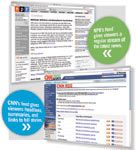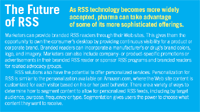Alternative Media: RSS Revolution
RSS has the power to change how users consume Web-based content, giving them control of their information and increased privacy.
RSS. if you've never heard of it, rest assured, you're not alone. It's likely that in 1995, you hadn't heard of e-mail either. Yet, try to imagine your life without it now. Ninety-one percent of Internet users now use e-mail on a regular basis. While Really Simple Syndication (RSS) is still in its infancy—it has an estimated six million users, according to the Pew & Internet Life Project—recent research indicates penetration rates are increasing rapidly. And, a recent Slashdot.org study reveals that 73 percent of RSS users intend to increase their RSS consumption this year.

Hensley Evans
Pharma marketers are focusing increasingly on the Web to reach and educate their target audiences. RSS is a new technology that provides pharma marketers an opportunity to foster a relationship with consumers that leads to strong brand affinity and trust.
RSS adoption is expanding beyond the tech-savvy population, and with Microsoft's plan to incorporate RSS into the Windows operating system in late 2006, RSS will have multiple industries using the technology, including pharma. Pharma marketers can greatly benefit from exploring this new technology, as RSS has the power to change how users consume Web-based content, giving them control of their information consumption and increased privacy.

Marc Blumberg
RSS Defined
Although RSS has been around since the early 1990s, it has gained widespread attention only recently. The explosion of blogs and rapid adoption by news publishers has helped to feed the recent growth.
RSS is a technology that allows marketers to publish content feeds on their Web sites that users can subscribe to. Users then manage the feeds through a desktop application called a reader or aggregator (which is either free or available for a small fee) that automatically downloads new content and delivers it to the user. Readers then notify users through a pop up—similar to e-mail notifications—that new content is available. Users can then read the headlines and decide whether or not to follow the links to new information.

To obtain desktop RSS readers, users must go to a specific Web site and download the application. Although there are many readers available, there is no de facto standard (like Outlook); however, Microsoft's announcement that it will incorporate a reader into its operating system—a test version of the browser will be available later this summer—indicates that software developers are taking notice of the potential of RSS.
Web-based RSS applications also exist, allowing users to access RSS feeds through Web sites instead of a desktop application. This allows users to access their RSS feeds from anywhere they have an Internet connection.
Why RSS?
There are many ways pharma marketers might consider leveraging RSS-based marketing. Pharma marketers can use RSS to increase compliance by enhancing the frequency of communication with patients and caregivers. Regular RSS feeds can provide patients with timely reminders, disease management tips and news related to a specific product or disease. And, if a product treats a sensitive condition where patients are hesitant to provide personally identifiable information, such as HIV/AIDS, RSS can help them to obtain the information while remaining anonymous.

The Future of RSS
RSS marketing can also improve relationships with key constituents, namely healthcare professionals, key opinion leaders, and advisory panels, by providing them with up-to-date product news, new indications, or new research. Recipients can receive the information instantly and opt to read what they find most relevant.
To provide users with even more access to relevant information and to leverage the work of third parties, pharma marketers can integrate RSS feeds from other Web sites, such as medical portals, associations, non-profits or disease-state sites. For example, a pharma marketer could include the feeds from WebMD that provide the most relevant information to their target audiences.
Another benefit is that effective RSS-based marketing solutions can improve a Web site's search-engine rankings. Search engines typically give higher rankings to Web sites that include regular content refreshers, and adding RSS feeds provides this capability. Also, the greater the number of incoming links to a Web site, the higher the ranking. RSS feeds are often syndicated on other sites, but the host site receives the incoming links, often resulting in improved rankings.
RSS also circumvents many of the obstacles—such as spam, undeliverable e-mails, and e-mail overload in users' in-boxes—inherent in e-mail marketing. The proliferation of spam has made many consumers reluctant to provide their e-mail addresses, regardless of the marketer's reputation or perceived value exchange. Since no personally identifiable information is required to receive RSS feeds, RSS provides a perfect alternative for those otherwise unreachable consumers.
Content Strategy
Ultimately, consumers are looking for more control of their electronic media consumption. RSS allows them this control because users only receive RSS feeds that they sign up for, and they can cancel them at any time.
As with e-mail use, it's important for pharma marketers to understand their audience, their communication preferences, and the type of information they want to receive.
When users view RSS content, they are in a different mindset than when they read Web content. While Web surfers typically read only short headlines, RSS users tend to be interested in more substantive articles. Creating catchy but accurate headlines and summaries that link to new, insightful content is a strong approach.
Marketers must also be wary of the kinds of content that will be distributed on RSS feeds and at what intervals. Because of the lengthy internal review and approval process required for many pharma-sponsored patient and healthcare professional communications, pharma marketers often struggle to distribute valuable content monthly, much less daily or weekly, as is currently expected with RSS feeds.
The content strategy must also be compelling because it's easy for users to opt out or ignore the RSS feeds.
Implementation
Successful implementation requires understanding the appropriate uses for RSS, how to integrate it with e-mail and other marketing efforts, and how to measure the effectiveness of RSS.
It's important to study the metrics of your RSS implementation. As in any marketing campaign, obtaining detailed metrics, including information on the number of subscribers, feed recipients, open rate, and click-through rates, is crucial.
Marc Blumberg is senior vice president of imc2. He can be reached at marc.blumberg@imc2.com
Hensley Evans is vice president of imc2's pharmaceutical practice. She can be reached at Hensley.evans@imc2.com
People
SCIREX appointed James Ottinger as senior vice president of regulatory affairs, Cornelia Kamp as executive officer of clinical site operations, and Robert R. Allen as executive officer of science and medicine in the clinical site operations division. » Pascal King joined etrials Worldwide as president of its European subsidiary.

Cornelia Kamp
Accounts
Monitorforhire.com has teamed up with Global CINRG to provide them with monitors for their clinical trials. » Daiichi selected SAS Drug Development to provide a host of clinical trial software. » Elsevier MDL and Spotfire have linked up to bring together MDL's Isentris technology platform and the Spotfire DecisionSite for Lead Discovery application.
Awards
SLACK Incorporated's OSN SuperSite won a bronze award from the American Society of Healthcare Publication Editors in the online category for overall Web publication. includes daily news updates.

The Misinformation Maze: Navigating Public Health in the Digital Age
March 11th 2025Jennifer Butler, chief commercial officer of Pleio, discusses misinformation's threat to public health, where patients are turning for trustworthy health information, the industry's pivot to peer-to-patient strategies to educate patients, and more.
Navigating Distrust: Pharma in the Age of Social Media
February 18th 2025Ian Baer, Founder and CEO of Sooth, discusses how the growing distrust in social media will impact industry marketing strategies and the relationships between pharmaceutical companies and the patients they aim to serve. He also explains dark social, how to combat misinformation, closing the trust gap, and more.